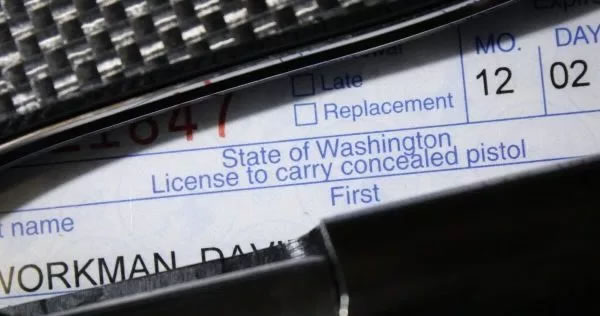
Evergreen State rights activists are cautiously sighing in relief with what appears to have been Wednesday night’s legislative cutoff death of a handful of gun control bills in the Legislature, but they are mindful that “it ain’t over ‘til the fat lady sings,” and she’s not yet approached the microphone.
According to a report from the National Rifle Association’s Institute for Legislative Action, legislation that would have banned possession of so-called “high capacity magazines” didn’t make the cut. Also derailed was Substitute Senate Bill 5174, which would have required the state’s 600,000-plus concealed pistol license holders, and all new applicants, to take a training course that it’s not clear anyone was qualified to teach, in order to renew or obtain a CPL.
The measure would have required “proof that he or she has completed a recognized firearms safety training program within the last five years.” Under this measure, the required course would have had to include a minimum of eight hours of instruction on:
(i) Basic firearms safety rules;
(ii) Firearms and children, including safe storage of firearms and talking to children about firearms safety;
(iii) Firearms and suicide prevention;
(iv) Safe storage of firearms to prevent unauthorized access and use;
(v) Safe handling of firearms;
(vi) State and federal firearms laws, including prohibited firearms transfers;
(vii) State laws pertaining to the use of deadly force for self-defense;
(viii) Techniques for avoiding a criminal attack and how to manage a violent confrontation, including conflict resolution; and
(ix) Live-fire shooting exercises on a firing range that include a demonstration by the applicant of safe handling of, and shooting proficiency with, each firearm that the applicant is applying to be licensed to carry.
Veteran gun rights lobbyist Joe Waldron noted via social media that the bill “(had) nothing to do with gun handling or safety. It was/is all about reducing the number of CPL holders. I spent 20 years lobbying guns in Olympia. If you look at the bills filed, many/most have nothing to do with ‘gun violence.’ They’re intended to place hurdles in front of law abiding citizens.”
Some argue that requiring a proficiency test for every firearm a person might want to carry is a form of de facto gun registration. Others were concerned that once the course was mandated, the state would simply not provide enough availability, in every community, for the state’s 612,000 CPL holders to take it. And there were concerns about cost.
In an email blast earlier this week, the Michael Bloomberg supported Everytown for Gun Safety, a New York-based gun prohibition lobbying group, lamented that “a handful of senators under the pressure of the gun lobby changed their minds about our bill…”
So, the measure was the brainchild of a bunch of New York anti-gunners, is that what Everytown was claiming? Washington is not New York, and in the Pacific Northwest, most people still regard gun ownership as a constitutionally-protected fundamental right, not a government-regulated privilege.
And it wasn’t the “gun lobby” that apparently flooded Olympia with calls and messages, it was embattled gun owners who have had enough of being treated like second-class citizens by a handful of wealthy elitists for merely exercising a protected right, if one reads their social media remarks.
There are still several gun control bills that remain very much alive. Among them, according to NRA-ILA are:
House Bill 1786, which would “expand firearm seizures to a wider range of protective orders with little to no due process, and in some cases, would remove a judge’s discretion as to whether to impose firearm restrictions upon respondents of protective orders.”
Senate Bill 5027, which seeks to expand the current ERPO (Extreme Risk Protection Order) so it can be “issued against minors while also infringing upon the self-defense rights of law-abiding parents or others in the household without due process.”
Senate Bill 5181, which the NRA says “would suspend Second Amendment rights without due process for six months from individuals who are admitted for a 72-hour mental health evaluation, but who are not subsequently involuntarily committed.”